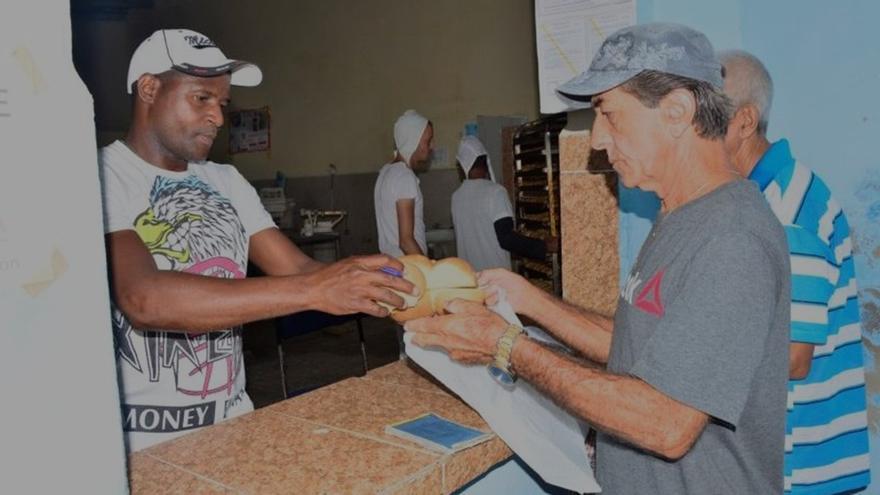
![]() 14ymedio, Havana, 6 December 2023 — The directors of the Sancti Spíritus Food Industry Company complained on Wednesday that what they call “the war between Russia and Ukraine” has triggered the price of wheat imported by Cuba. Each ton of flour costs the country 13 million pesos, they explained, three times more than what it used to pay before the invasion decreed by Vladimir Putin. In the province, the solution to save raw material has been drastic: reduce the size of the bread rolls.
14ymedio, Havana, 6 December 2023 — The directors of the Sancti Spíritus Food Industry Company complained on Wednesday that what they call “the war between Russia and Ukraine” has triggered the price of wheat imported by Cuba. Each ton of flour costs the country 13 million pesos, they explained, three times more than what it used to pay before the invasion decreed by Vladimir Putin. In the province, the solution to save raw material has been drastic: reduce the size of the bread rolls.
Before the war, COVID-19 had already made the price of bread more expensive, causing a season of shortages on the tables from which the citizens have not been able to recover. A ton of wheat, which the country buys and processes in its mills because it’s cheaper than importing flour, is enough to satisfy 12 days of national production. In the case of Sancti Spíritus, 28.4 tons of flour are needed daily to produce standard bread, but only 24 are being received.
What the leaders themselves call a “small ball” (a roll) of rationed bread has had to be made smaller. The approximately 3.5 ounces that each bread roll weighed has now become 2 ounces. The good news, if there is one, is that the price has also dropped: it costs 25 centavos less, explained the director of the Food Industry in the province, Víctor Díaz Acosta.
Díaz Acosta also regretted that, since he subsidizes almost 50% of the production cost of standard bread – about 1.40 pesos – his company registers a loss of between three and four million pesos each month, partly compensated by the profits of the “released [unrationed] sale.” The leader admitted, during an interview with the newspaper Escambray, that he is no stranger to the second problem of bread, in addition to the shortage of wheat: its quality.
The debacle of bread production is so alarming in Cuba, that the official press itself has analyzed on several occasions the possible ways to solve it, without ever finding a satisfactory method
This is influenced by the baker, the technical state of the equipment, the quality of the raw material and the blackouts that interrupt the cooking process, which is basically done with electricity, he explained.
However, the provincial section of the Food Industry in Sancti Spíritus has no losses, Díaz Acosta said. It is saved by its alliance with the “new economic actors” (the private sector), which allows it to make other products: a baguette that is sold in state establishments at 75 pesos and dough for pizzas and breadsticks.
In that way, the leader explained, Sancti Spíritus saves the country 39 million pesos. It is the only entity of its kind in the country that can boast of a contribution of that caliber, despite the U.S. blockade and the thousand and one shortages that threaten the “socialist state company,” Díaz Acosta said.
The official also recognizes that, while state production hangs by a thread, the private sector continues to offer bread to their customers, against all odds; of course, at prohibitive prices for most people in the province. This situation does not bother Díaz Acosta, who pragmatically affirms that “it is better to have the availability than not.”
The debacle of bread production is so alarming in Cuba that the official press itself has analyzed on several occasions the possible ways to solve it, without ever finding a satisfactory method. Each new article becomes obsolete in a few weeks, because inflation does not take long to raise the price bar a little more. So much so that many Cubans can no longer afford goods like eggs or meat, which threaten to become luxury items.
Meanwhile, the citizens of Sancti Spíritus have become accustomed to the “original” solutions of the food industry company, which at the end of last year – in the midst of the umpteenth wheat crisis – had consented to bakeries using up to 20% of rice-husk residue to make bread. The end-of-the-year bread will not be as hard and sour as then, but nor will it serve to kill hunger.
Translated by Regina Anavy
____________
COLLABORATE WITH OUR WORK: The 14ymedio team is committed to practicing serious journalism that reflects Cuba’s reality in all its depth. Thank you for joining us on this long journey. We invite you to continue supporting us by becoming a member of 14ymedio now. Together we can continue transforming journalism in Cuba.
